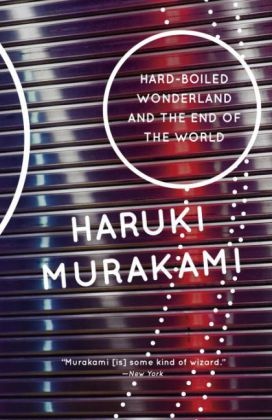Read more
Zusatztext “Murakami’s bold willingness to go straight over the top [is] a signal indication of his genius . . . a world-class writer who has both eyes open and takes big risks.” – The Washington Post Book World “He has become the foremost representative of a new style of Japanese writing: hip! cynical! highly stylized! set at the juncture of cyberpunk! postmodernism! and hard-boiled detective fiction. . . . Murakami [is] adept at deadpan wit! outrageous style.” – Los Angeles Times Magazine “Fantastical! mysterious! and funny . . . a fantasy world that might have been penned by Franz Kafka.” – Philadelphia Inquirer “Rich in action! suspense! odd characters and unexpected trifles . . . [a] provocative work.” – The Atlantic “Murakami’s gift is for ironic observations that hint at something graver. . . . He is wry! absurd! and desolate.” – Los Angeles Times Book Review “[A] mix of American fun and Japanese dread.” –Esquire “An intertwining DNA model of seemingly contrary elements . . . a combination of Kafka’s castle! Borges’s library! and the Prisoner’s TV village.” – Village Voice Literary Supplement “Off the wall . . . hilariously bizarre . . . splendid . . . a remarkable book . . . Alfred Birnbaum . . . has captured the crazed! surreal feel of Murakami’s Japanese.” – The Times (London) “His novels . . . are set on fast-forward: raucous! slangy! irreverent.” – Details Informationen zum Autor Haruki Murakami is a best-selling Japanese writer. His works of fiction and non-fiction have garnered critical acclaim and numerous awards, including the Franz Kafka Prize, the Frank O'Connor International Short Story Award and the Jerusalem Prize, among others. Murakami's fiction is humorous and surreal, focusing on themes of alienation and loneliness. He is considered an important figure in postmodern literature. The Guardian praised Murakami as "among the world's greatest living novelists" for his works and achievements. Murakami is the author of 1Q84, The Wind-Up Bird Chronicles, Men Without Women and many more. Klappentext Hyperkinetic and relentlessly inventive, Hard-Boiled Wonderland and the End of the World is Haruki Murakami's deep dive into the very nature of consciousness. Across two parallel narratives, Murakami draws readers into a mind-bending universe in which Lauren Bacall, Bob Dylan, a split-brained data processor, a deranged scientist, his shockingly undemure granddaughter, and various thugs, librarians, and subterranean monsters collide to dazzling effect. What emerges is a novel that is at once hilariously funny and a deeply serious meditation on the nature and uses of the mind. 1 Elevator, Silence, Overweight The elevator continued its impossibly slow ascent. Or at least I imagined it was ascent. There was no telling for sure: it was so slow that all sense of direction simply vanished. It could have been going down for all I knew, or maybe it wasn’t moving at all. But let’s just assume it was going up. Merely a guess. Maybe I’d gone up twelve stories, then down three. Maybe I’d circled the globe. How would I know? Every last thing about this elevator was worlds apart from the cheap die-cut job in my apartment building, scarcely one notch up the evolutionary scale from a well bucket. You’d never believe the two pieces of machinery had the same name and the same purpose. The two were pushing the outer limits conceivable as elevators. First of all, consider the space. This elevator was so spacious it could have served as an office. Put in a desk, add a cabinet and a locker, throw in a kitchenette, and you’d still have room to spare. You might even squeeze in three camels and a mid-range palm tree while you were at it. Second, there was the cleanliness. Antiseptic as a brand-new coffin. The walls and cei...

